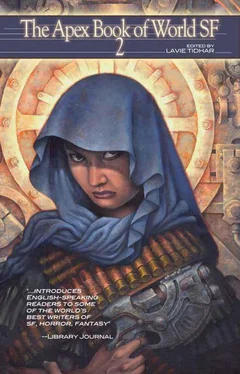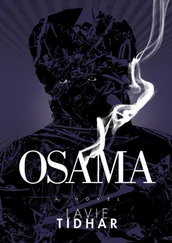“So?” Chaya panted.
Emilio lowered the paper roll. He had a smile on his face. “Call Fritz. We’re ready.”
“Hey, Beans. Message for you.”
Fritz pretended he hated it when the guys called him names but, deep inside, he liked it. Beans was the only meal available on the front and to the militia’s fanfare, it came locked up in a rusty can. He couldn’t eat, of course, because of his mechanical physiology, but his camaradas in the troop said he had solidarity with the cans. Sometimes, a fat Yankee called Ernest would point a tin opener at him, saying he was hungry. Everybody would laugh. With the clocks inside his mind, he calculated that this attitude wasn’t prejudice, or mockery, but banter. He was the exhaust valve for the tedium, the tension at the barricades, the long wait for an enemy that never came despite the news of troops manoeuvring some miles ahead. He finally calculated, with some fair bit of precision, that he was one of the guys, too. After all, he had the same black and red kerchief round his neck.
They sat behind the barricade mounted in front of the old Chateclair casino, a well-conserved building by the war’s standards. His mates felt triply happy to see it still standing. The spot close to the neighbourhood’s limits used to be the entertainment district for the factory’s technicians and administrators. It’d be a shame if the next generation of workers couldn’t have access to that architectonic marvel. Besides, the docking tower for personal dirigibles made an excellent observation post. Fritz was fighting against a loose piston in La Sigaretta, the steam-powered machine gun guarding the brothel’s entrance, when he heard his name being called at the building’s foyer. This was the soldier’s third reason for being happy. The place was part of the postal service network, and its pneumatic tubes winding their way underground still carried, brought, and sometimes intercepted messages from all over Catalonia. He dropped the piston and hurried to the building.
“It’s from your babe.” Buenaventura winked, a letter in one hand and a wooden tube on the other. The boy was barely sixteen and was proud of spending his days watching the comings and goings of messages travelling in the pipe cathedral behind the counter.
In the message, Chaya said to come back quickly, everything’s ready. Obviously, he understood the message, as did Buenaventura and other two or three militiamen with whom the motolang had shared his hopes. He smiled, showing off the letter, trying to explain to those hardened men alchemical processes he could hardly understand. But they did understand the joy of that moment and would’ve opened a nice bottle of wine if they’d had one.
The first bomb destroyed the casino’s wall.
Fritz tried to free himself from the human wreckage over his body, tried to adjust his sensors, but there was only dust around him and a humming sound coming from the back of the room. It took him several seconds to recalibrate his optics and phones, but now he could listen to the shots and screams outside, and the moans of the survivors inside. He saw young Buanaventura crawling to the back of the counter, alive and in one piece. He decided to run to the street.
The second bomb exploded past the barricades, in the middle of the street, but Fritz couldn’t see if anyone had been hurt. He threw himself behind the mountain of sacks, between La Sigaretta and Ernest, who had just crouched after shooting through the wall of dust covering their position.
“Make this damn machine gun work, Beans.” Ernest roared, as he knelt and shot his carbine along with three militiamen.
“What’s happening? Where are they?” Fritz crawled closer to the machine gun. Bullets whistled over their heads. He was afraid the bullets would ricochet off him, hitting his comrades’ hearts. On his left, a soldier’s gun jammed and backfired, tearing the boy’s brass face apart.
Ernest reloaded his hunting rifle and looked up. “They just popped up and opened fire. They closed the passage down the street with floating trucks and then started throwing their mortars at us.” He locked the crank and closed his eyes as if praying. “For fuck’s sake, where’s that damn sentinel?”
Fritz managed to light the boiler, but he knew it’d be a long time before the high-pressure system could start working. Another bomb exploded, but he didn’t know where. If You look after the atheists, too, please make the water boil faster . He picked up his janizary-carbine lying close to the sacks, calibrated his optics and the pulleys in his arms and, jumping over the barrier, aimed at the enemy. Beyond a blood-red haze in front of the church, there were three black floating trucks blocking the end of the street. It seemed the trucks had their paintings rasped off. Those weren’t men from the Consortium, he was sure, nor from any other army he knew of. But there was something familiar about the soldiers throwing pulse grenades at them, holding brand-new, shining rifles. Tick-tock .
“Beans! Shoot!”
As soon as he got the lay of his gun, Fritz locked his aim at a soldier crossing the street towards a Stanley parked on the corner. Tick-tock, tick-tock . There were two more soldiers entrenched behind the automobile, a moving shield that could easily reach the Chanteclair.
“Shoot! Now!”
Tick-tock, tick-tock, tick-tock.
His instincts were part animal, part clockwork, and both made him keep the running lad in his sights until he got close to the steamer. The boy had his head low, his right hand covering the ear, protecting his head or praying it could hide him.
“Shoot!”
His first shot at something mortal.
He pulled the trigger a second before the soldier could leap to safety. There was a report and a blast at the boy’s neck. He fell dry, no screaming, his face crushing the car’s bumper.
Fritz crouched down an instant before a bullet hit the camarada next to him. Ticktockticktockticktock . He pushed the dead soldier away and once again bent himself over the sacks. He shot once, twice, thrice, suppressing every possible movement of the enemy line. He was covering Ernest, ready to throw another grenade, when he heard a low whistling noise. Another bomb exploded close to trucks, but the rise of the high-pitched sound made the troops freeze for a second.
“Fritz,” Ernest yelled.
“I’m coming, for fuck’s sake, I’m coming.” He dropped the carbine and almost threw himself over the steamgun. “Cover me!” The dangling piston insisted on slipping from his fingers, all damp thanks to the vapour leaking from the gun’s opened valve. Even with suppressive fire, enemy bullets kept coming in his direction. He had to keep his head low like the boy he had just killed. After infinite seconds, he managed to fix the piston into position, but it took him another eternity to find a wrench amongst the corpses. The whistle grew louder and louder and, as soon as he turned the screw nut, the machine gun’s long muzzle started to spin, steaming.
Ticktockticktockticktockticktock…
Fritz pulled the trigger, wishing someone had already placed the ammo belt into the feedway. The noise was so loud every soldier this side of the battle was thrown to the ground. It was the sound of a jackhammer crushing the wall of sacks, cars and people standing less than three hundred metres away. Drifting his range, Fritz watched the Stanley dissolve under La Sigaretta’s fire. The car was torn to pieces: wheels, chassis, seats. Bullets of hell-knows-what calibre pierced its hull as if it were made of paper. He slowly turned the gun to the enemy’s central position and thrust the black trucks away with the violence of a thousand lead wasps. He lost connection with time.
Читать дальше












